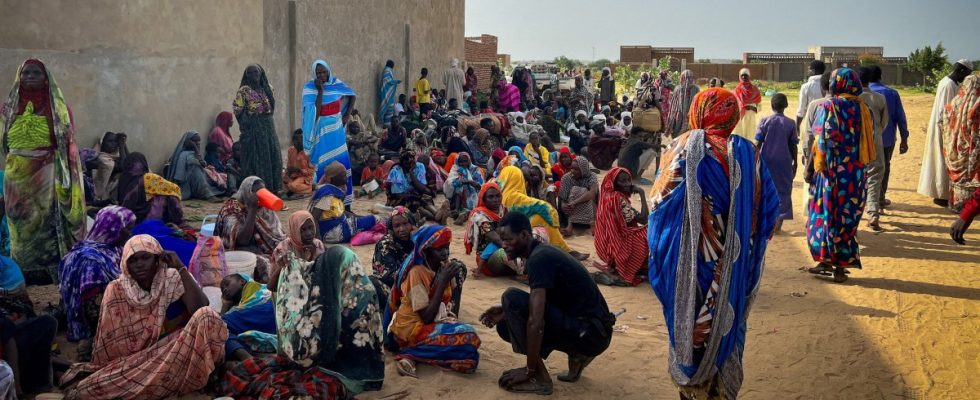The war in Sudan has claimed the lives of thousands since mid-April and displaced more than three million from their homes. Violence is escalating, especially in Darfur, where an old conflict has flared up again. In one week in June, at least 87 civilians, including women and children, are said to have been murdered and buried in a mass grave near the city of Al-Junaina. The UN High Commissioner for Human Rights reported on Thursday.
The duel between generals Abdel Fattah al-Burhan and Mohamed Hamdan Dagalo aka Hemeti for power in Sudan has long since spread to areas outside the capital Khartoum. And Darfur has become the bloodiest battlefield. The UN blames Hemetis Rapid Support Forces (RSF) for the Al-Junaina killings. The RSF reject the allegation. Now the International Criminal Court in The Hague is investigating. “We are in the middle of a humanitarian catastrophe,” said its chief prosecutor, Karim Khan.
Hemeti apparently wants to turn Darfur, which is rich in gold and other natural resources, into a safe haven for his fighters. He is continuing the scorched-earth policy that the Janjaweed — the “devils on horses” — terrorized non-Arab residents of the province with 20 years ago — commissioned by then-President Omar al-Bashir. After the fall of Bashir, the Janjawid became the RSF. Hemeti now faces the same fate as Bashir: he was sentenced by the International Criminal Court in 2009, as the first incumbent head of government.
South Sudan has the greatest interest in peace, also because of its pipeline
All attempts to end the war in Sudan have so far failed. There is no shortage of attempts. The presidents of Sudan’s neighboring countries met in Cairo on Thursday. An agreement was reached with representatives of the African Union and the Arab League that their foreign ministers should meet regularly. But as far as the situation in Sudan is concerned, no real progress has been made. A regional action plan presented by host Abdel Fattah al-Sisi remained vague. And from the RSF’s point of view, Egypt is not an option as a mediator anyway – because of its proximity to army chief Burhan.
The heads of state of the seven neighboring countries are meeting in Cairo: in the foreground are the presidents of the Central African Republic, Egypt and South Sudan (from left).
(Photo: Egyptian Presidential Office/AFP)
A group of East African countries also presented a plan this week to end the war in Sudan. After discussions in Addis Ababa on Monday, representatives of Kenya, Ethiopia, Djibouti and South Sudan proposed a face-to-face meeting between the two parties to the conflict and the deployment of soldiers to protect civilians and facilitate humanitarian aid.
South Sudan in particular has a great deal of self-interest in an end to the fighting. 160,000 refugees from Sudan are already in the country – and are contributing to the fact that the precarious security and supply situation is further deteriorating. In addition: South Sudan’s most important source of income is oil, but the gateway to the world market is the Sudanese port city of Port Sudan. The pipeline through the northern neighboring country is a lifeline for South Sudan. There is great concern that war will cut off this lifeline.
But as ambitious as the peace plan is, it is likely to be hopeless at the moment. Because while Hemeti sent a representative, the army stayed away from the meeting. Kenyan President William Ruto is not suitable as a mediator, it was said from Burhan’s camp – he supports the RSF. The talks in Addis and Cairo are therefore under opposite but similarly unfavorable conditions.
So far, neither Burhan nor Hemeti have shown any willingness to back down. The talks in Jeddah, brokered by the United States and Saudi Arabia, were suspended in early June because both sides failed to comply with agreed ceasefires. The army declared the German UN special envoy, Volker Perthes, to be an undesirable person after his mild criticism of the bombing of civilian targets.
Their brutality has cost both warlords the support of the humans
Both the army and the RSF apparently believe they can win the war. They are strengthened by the arms shipments from their allies. Hemeti receives anti-aircraft missiles from the United Arab Emirates and Saudi Arabia. On the army side, Egyptian military advisers and soon Turkish ones Bayraktar– use drones. The Kremlin is also involved via the Russian Wagner group. As in Libya, the war in Sudan is an international war.
But the situation has not yet turned into a real civil war, which UN Secretary-General António Guterres recently warned about. It remains a battle of generals that terrorizes the people but hardly mobilizes them. “Their brutal actions cost both Burhan and Hemeti broad support from the population,” says human rights activist Mudawi Ibrahim Adam. “So I don’t believe in a civil war along ethnic lines.”
The activist Hala Al-Karib also avoids the term. “The absolute majority of the Sudanese are organized in local networks,” says the director of the Sudan program Women’s rights organization SIHA. An end to the war would mean the loss of power for both armies. “The international community must not only talk to the two generals and their financiers,” she demands.
But there isn’t much time left. When citizens took to the streets against the presence of armed men in the city of Bara in Kordofan province, which had so far been spared the fighting, RSF militiamen shot and set fire to the market hall.

